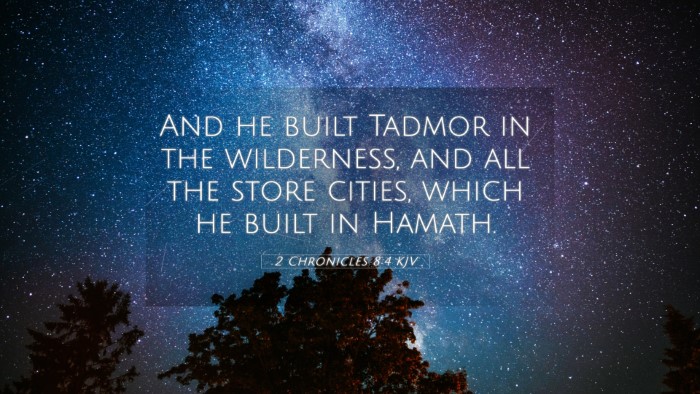Understanding 2 Chronicles 8:4
2 Chronicles 8:4 states:
"And he built Tadmor in the wilderness, and all the store cities, which he built in Hamath."
This verse highlights Solomon's extensive building projects and his strategic military and economic initiatives. It serves as a testament to his wisdom and administrative prowess.
Key Themes and Insights
The following insights drawn from public domain commentaries enhance our understanding of this scripture:
- Solomon's Wisdom and Wealth: Matthew Henry notes that Solomon's endeavors were a direct reflection of the divine wisdom God bestowed upon him, which enabled unparalleled feats in architecture and governance.
- Strategic Planning: Albert Barnes emphasizes the significance of building store cities, which served as economic centers, indicating Solomon's foresight in ensuring resource availability and defense.
- Theological Implications: Adam Clarke draws attention to the symbolic nature of Tadmor as a beacon of prosperity, stressing the connection between spiritual and material abundance in Solomon's reign.
Bible Verse Cross-References
2 Chronicles 8:4 is interconnected with various other scriptures that illuminate its message:
- 1 Kings 9:18: This passage discusses the building of cities and fortifications in the same geographical context, emphasizing Solomon's great works.
- 2 Chronicles 8:1: It speaks of Solomon’s prosperity after the completion of the temple, framing the subsequent building activities in a context of divine favor.
- Proverbs 24:3-4: These verses describe the wisdom and understanding required in building a house, paralleling Solomon’s ability to construct cities with divine insight.
- 1 Kings 10:26: It speaks of Solomon's accumulation of chariots and horsemen, linking military strength with the cities he established.
- Isaiah 33:20: This verse points to the future vision of Jerusalem, reminiscent of the foundational work laid by Solomon in his reign.
- Nehemiah 3:1: It illustrates the continuity of building efforts initiated during Solomon’s time, showing a legacy of construction that extends to later figures in the Bible.
- Ezekiel 37:26: The restoration of Israel is also connected to the peace and prosperity that Solomon’s reign symbolizes.
Comparative Bible Verse Analysis
A comparative study of Solomon’s projects reveals deeper theological insights:
- Barnes suggests looking at other kings’ building efforts to contrast the magnitude and purpose of Solomon's constructions.
- Henry notes similarities in the motivations behind these constructions, centering on the need for security and commerce.
- Clarke invites interpreters to explore how these physical structures were intended to reflect spiritual truths about God’s provision for His people.
Scriptural Cross-Referencing
This verse serves multiple purposes in scripture cross-referencing. The establishment of cities by Solomon can be connected with:
- The prophecies concerning the flourishing of Israel (Psalms 72:16).
- Jesus’ mention of wise builders in the New Testament, where spiritual foundations are laid (Matthew 7:24).
- Historical narratives that depict the recurring theme of God granting peace and stability when His covenant is honored (2 Chronicles 24:20).
Thematic Bible Verse Connections
Examining the themes present in 2 Chronicles 8:4 reveals profound connections across the Bible:
- Divine Provision: The assurance of God’s guidance in endeavors leading to prosperity (Philippians 4:19).
- Wisdom in Leadership: Comparable to New Testament exhortations for leaders, reflecting Solomon's role (James 1:5).
- Community and Security: The emphasis on building for communal benefit is seen in Romans 12:10.
Purpose of Cross-Referencing Biblical Texts
In understanding 2 Chronicles 8:4, cross-referencing serves several important purposes:
- It provides a holistic view of biblical events and themes, identifying how to use Bible cross-references to deepen understanding.
- Highlighting connections between Old and New Testament teachings enriches our grasp of the consistent narrative of God’s faithfulness.
- It equips believers with tools for Bible cross-referencing that can be applied in personal study and sermon preparation.
Conclusion
In summary, 2 Chronicles 8:4 is a multifaceted verse that illustrates Solomon's administrative acumen, guided by divine wisdom, in building cities that represented both physical and spiritual fortitude. By utilizing various public domain commentaries and cross-referencing associated scriptures, we can appreciate the depth and significance of this passage within the larger biblical narrative.



